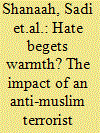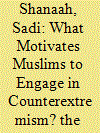| Srl | Item |
| 1 |
ID:
188023


|
|
|
|
|
| Summary/Abstract |
The dominant academic narrative portrays British Muslim communities as alienated by counter-terrorism policies and consequently reluctant to cooperate with authorities by taking action against Islamist extremism. This article reassesses and nuances the “alienation narrative” with the use of unique data from three robust surveys of British Muslims. It finds that although a minority shows signs of alienation, most British Muslims are satisfied with and trust counter-terrorism policies as well as the government and the police. The level of willingness to take action against Islamist extremism is also high. The study confirms that aspects of alienation correlate with reduced willingness to take action against Islamist extremism, although they do not necessarily lead to disengagement.
|
|
|
|
|
|
|
|
|
|
|
|
|
|
|
|
| 2 |
ID:
190908


|
|
|
|
|
| Summary/Abstract |
This article examines the impact of the March 15, 2019 far-right terrorist attack against Muslims in Christchurch, New Zealand on public opinion toward Muslims. It also examines whether the impact of the attack varies for individuals across the political spectrum. We make use of data from the 2019 New Zealand Attitudes and Values Study (N = 47,951) to compare the attitudes of New Zealanders before and after the attack. Using a range of statistical techniques, including regression discontinuity analysis, we find robust evidence that the attack led to an immediate increase in warmth toward Muslims. We also show that this increase was driven by both left-wing/liberal and right-wing/conservative individuals in the immediate days after the attack. Soon after the attack, however, attitudes toward Muslims among the politically conservative population tended to revert to pre-attack levels. By contrast, political liberals maintained their heightened level of positive attitudes for a longer period. We discuss the possible theoretical reasons for these findings.
|
|
|
|
|
|
|
|
|
|
|
|
|
|
|
|
| 3 |
ID:
179984


|
|
|
|
|
| Summary/Abstract |
Western governments increasingly encourage Muslims to challenge Islamist extremism. However, the dominant academic and public discourse regards Muslims as deeply alienated and thus reluctant to do so. The article investigates motivations for Muslim counterextremism engagement and based on that formulates policy recommendations that are useful to government agencies that seek to mobilize Muslim communities to fight Islamist extremism. The analysis finds that Muslims are more likely to mobilize if governments highlight how Islamist extremism violates Islamic and universal values, how it negatively affects particular sections of Muslim communities, and how it can be successfully tackled by Muslim-based action.
|
|
|
|
|
|
|
|
|
|
|
|
|
|
|
|